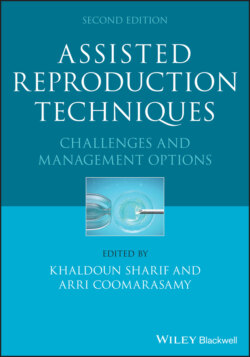Читать книгу Assisted Reproduction Techniques - Группа авторов - Страница 44
Management of patients Hepatitis B
ОглавлениеInfertility patients known to have chronic carrier status of HBV should be managed in a fertility unit with appropriate expertise. In cases where partners have discordant HBV serological status, it is recommended that the unaffected partner receives HBV vaccination.
In women who are HBV chronic carriers, there has been conflicting evidence regarding the effect of HBV on pregnancy. Overall, pregnancy does not seem to affect the disease course of chronic HBV infection. If pregnancy is achieved naturally, the risk of neonatal infection from a chronically infected mother is 2–15% [7]. If the mother is acutely infected with positive HBsAg and anti‐HBc then the risk of vertical transmission rises to 80–90%. In either case, the neonate should be vaccinated at birth. Hepatitis B vaccination and a dose of HBV immunoglobulin administered to the neonate within the first 24 hours of life reduces the risk of HBV infection and carrier status by up to 90% [8].
In ART, previously published studies assessing the fertility treatment outcomes in couples with at least one partner who is HBV seropositive have yielded conflicting results [9]. Some observational studies have shown lower pregnancy rates in couples undergoing ART with HBV whilst others have not shown this [10,11]. It has been suggested that the lower pregnancy rates amongst couples with HBV undergoing ART may be due to extra precautions in handling gametes and embryos [9]. Overall, it appears that in couples where one or both of the partners have HBV, the pregnancy outcomes are similar to unaffected couples.
Male partners with HBV have been shown to have poorer sperm results and lower oocyte fertilization rates; however, this does not seem to impact on ART outcomes [12]. In male HBV carriers, the female partner should have HBV vaccination to reduce the risk of sexual transmission. Sperm washing during ART is a common practice in this situation but is now not thought to be of clear benefit. Previously, it was considered unsafe to perform intra‐cytoplasmic sperm injection (ICSI) treatment for male HBV carriers due to the risk of HBV integration into the fetal genome. However, newer evidence has proven that this is not a risk.
In ART treatments involving HBV‐positive female partners, there has been evidence to show that HBV can affect the follicular fluid, oocytes and ovaries. However, women with HBV infected follicular fluid or oocytes do not appear to have worse ART outcomes [13]. Overall, ART is considered safe in both male and female carriers, and the risk of vertical transmission is similar to pregnancies conceived naturally. Therefore, the couple in Case History 1 should be reassured. They can commence their IVF treatment after appropriate pre‐pregnancy counseling and involvement of a hepatologist to ensure that the female partner does not have any signs of chronic liver disease.
